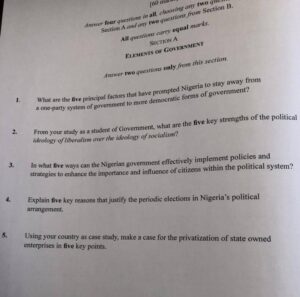WAEC 2025 GCE Government Essay and Objective Answers | 12th Nov – GCE Government (OBJ and Essay) Questions and Answers for Private Candidates (Nov/dec). Access the complete 2025 WAEC GCE Government Objective (OBJ) and Essay (Theory) Questions and Answers, and download the free WAEC Government syllabus in PDF.
The West African Examination Council, WAEC, has set the 2025 WAEC GCE Government Questions And Answers paper for 12th November 2025. Candidates are now preparing to perform well in the upcoming examination through the help of reliable resources, such as:
- WAEC GCE Government 2025 Questions and Answers
- WAEC GCE Government Expo 2025
- WAEC GCE Government Question 2025
- WAEC GCE Government Answer 2025
If you are one of these candidates, this article has provided the step-by-step guide on how to prepare effectively for access to verified solutions and to succeed in your 2025 WAEC GCE Government exam.
How to Get 2025 WAEC GCE Government Questions and Answers

WAEC 2025 GCE Government Essay and Objective Answers | 12th Nov
The West African Examinations Council (WAEC) has provided helpful materials on Government to help you prepare for the final exam, which will take place on Wednesday, 12th November, 2025. The exam will consist of Government 2 (Essay) and Government 1 (Objective). These resources are designed to guide you on what is expected and how to perform your best in the Senior School Certificate Examination (SSCE).
WAEC 2025 Government Questions and Answers – Time/Date:
| Subject | Exam Type | Time | Duration |
|---|---|---|---|
| Government 2 | Essay | 13:00 – 15:00 | 2 hrs |
| Government 1 | Objective | 15:00 – 16:00 | 1 hr |
WAE 2025 GCE Government ESSAY/THEORY Questions and Answers:
===========================
ANSWERS LOADING ==============
2025 WAEC GCE Government obj/objective Questions and Answers:
===========================
ANSWERS LOADING ==============
<<<KEEP REFRESHING THIS PAGE>>>
=========
2025 GCE Government Essay and Objective Answers | 12th Nov – WAEC
📘 Join Our WAEC Exam Room
Get live updates, likely questions, and connect with other students preparing for
WAEC GCE Government and other subjects.
WAEC GCE Government Past Questions and Answers


Gce GOVERNMENT Past Answers
01-10: ABCDDABABB
11-20: CCDABCDABC
21-30: BADBADDAAB
31-40: DBBDCDACDA
41-50: BACBCAAACD
Completed
WAEC GCE GOVERNMENT – MODEL QUESTIONS AND ANSWERS
Total Marks: 60
Instructions: Answer four questions in all: choose any two questions from Section A and any two questions from Section B. All questions carry equal marks.
SECTION A: ELEMENTS OF GOVERNMENT
1. Factors prompting Nigeria to move from a one-party system to a democratic system
Nigeria transitioned from a one-party system to a more democratic setup due to several key reasons. First, citizens demanded political freedom, wanting the right to participate in governance decisions that affect their lives. Second, a democratic system ensures accountability, making government leaders answerable for their actions. Third, democracy reduces the risk of dictatorship by limiting the concentration of power in a single party. Fourth, it encourages political competition, which motivates leaders to deliver better policies. Finally, democracy supports the protection of human rights, including freedom of speech, assembly, and association, which are restricted in a one-party system.
2. Strengths of liberalism over socialism
The political ideology of liberalism provides several advantages compared to socialism. Liberalism emphasizes individual freedom, allowing citizens to make personal and economic choices. It protects private property rights, encouraging people to own and manage their wealth. It promotes entrepreneurship, driving innovation and economic growth. Liberalism also advocates limited government interference, which allows markets to function efficiently. Lastly, it supports political pluralism, enabling multiple parties and democratic processes, unlike socialism, which often leans toward centralized control.
3. Ways Nigerian government can enhance citizens’ influence
Citizens’ influence in governance can be strengthened through several approaches. Encouraging civic participation ensures people take part in decision-making. Promoting freedom of speech allows citizens to voice opinions on public matters. Civil society organizations such as NGOs and unions can amplify citizen concerns. Ensuring government transparency, especially in budgeting and policy-making, strengthens trust. Lastly, implementing participatory policies at local and national levels allows citizens to contribute directly to decisions affecting their communities.
4. Reasons for periodic elections in Nigeria
Periodic elections in Nigeria serve important purposes. They provide legitimacy to elected leaders and a mandate from the people. Elections ensure a peaceful transfer of power, reducing political instability. They allow citizens to hold leaders accountable, rewarding performance or punishing failure. Elections also encourage citizen participation in governance, strengthening democracy. Finally, they stimulate political competition, motivating parties to present better policies and programs.
5. Reasons for privatization of state-owned enterprises
Privatization of state-owned enterprises (SOEs) can positively impact Nigeria’s economy. First, it improves efficiency, as private owners are incentivized to manage resources effectively. Second, it reduces the financial burden on government budgets. Third, it encourages competition, which leads to improved services. Fourth, privatization can attract foreign investment and modern technology. Lastly, it promotes entrepreneurship, offering opportunities for citizens to own and manage businesses successfully.
SECTION B: NATIONAL AND INTERNATIONAL GOVERNANCE
6. Functions of Emirs in Hausa/Fulani traditional governance
Emirs played crucial roles in precolonial Northern Nigeria. They were responsible for administering justice, resolving disputes based on Islamic and customary laws. They collected taxes and tributes, ensuring revenue for the emirate. Emirs also maintained law and order, providing security and stability. They acted as religious leaders, promoting Islam and supervising education. Finally, they were military leaders, organizing armies to defend territories and maintain peace.
7. Obafemi Awolowo’s influence as a nationalist leader
Obafemi Awolowo significantly contributed to Nigeria’s independence struggle. He introduced free primary education, building political goodwill and literacy among citizens. He promoted regional economic development through infrastructure and social programs. As leader of the Action Group, he mobilized citizens for political participation. Awolowo advocated federalism, strengthening regional autonomy and governance structures. He also implemented social welfare programs, such as healthcare and housing, improving citizens’ quality of life.
8. Advantages of cordial foreign policy with neighbouring states
Nigeria benefits in many ways from maintaining friendly relations with neighbouring countries. First, it promotes peace and security, reducing border conflicts. Second, it facilitates trade and economic cooperation, enhancing prosperity. Third, it strengthens regional integration through bodies like ECOWAS. Fourth, it enhances diplomatic and cultural ties, promoting mutual understanding. Lastly, it supports shared management of resources, such as rivers and infrastructure projects, benefiting all parties.
9. Significance of the 1963 Republican Constitution over the 1960 Constitution
The 1963 Constitution introduced several key improvements. It abolished the monarchy, making Nigeria a republic. It replaced the Governor-General with a ceremonial President, affirming national sovereignty. The Constitution strengthened federalism, clearly dividing powers between central and regional governments. It also reinforced Nigerian independence from Britain. Finally, it fostered national identity, uniting citizens under a republic and promoting civic pride.
10. Ways ECOWAS can strengthen itself as a sub-regional body
ECOWAS can consolidate its influence through several measures. Strengthening regional peacekeeping ensures stability in member states. Encouraging economic integration promotes trade and investment. Fostering political cooperation supports democracy and governance. Improving institutional capacity enhances the efficiency of secretariats and agencies. Finally, investing in cross-border infrastructure like roads, energy, and communication networks ties member states together and encourages regional development.
Answers loading…
Recommended Posts:
➤ 2025 WAEC GCE Financial Accounting 2nd Series Essay & OBJ Questions and Answers
➤ 2025 WAEC GCE CRS/IRS Essay & OBJ Questions and Answers Now Available
➤ 2025 WAEC GCE Biology OBJ/Essay Questions and Answers Now Available
➤ 2025 WAEC GCE Civic Education OBJ/Essay Questions and Answers Available Here
Disclaimer: We do not support exam malpractice. We only provide study materials to help you prepare and pass your WAEC GCE First Series exams.
